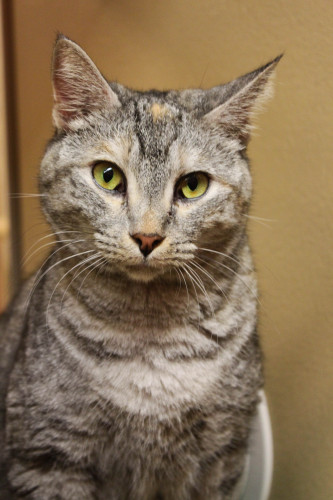Cats and Hyperthyroidism
By Sally (United Kingdom)
Hyperthyroidism in Cats
If left unchecked, hyperthyroidism can be a serious illness. Cats can be prone to developing this disease as they get older so it is important to know the signs that may indicate that is affecting your cat.

What is Hyperthyroidism?
The thyroid glands regulate your cat’s metabolism via a hormone called thyroxine (T-4). Producing too much of this hormone means that your cat has developed hyperthyroidism. It is not usually a form of cancer, although a small minority of cats who are diagnosed with the condition will go on to develop malignant tumors in the thyroid gland.
Hyperthyroidism is especially common as your cat gets older. Most cats who develop the condition are around the age of ten or older. It can develop earlier than this but it is rare for this to be the case.
What Are The Symptoms of Hyperthyroidism?
There are a number of symptoms that can indicate hyperthyroidism. Weight loss is one of the most common symptoms that encourages a trip to see your vet, especially if your cat is not experiencing a decline in appetite. Many cats with hyperthyroidism have a normal or increased appetite but will still be losing weight due to the increase in their metabolism.
Other symptoms can include restless behaviour, hyperactivity, a fast heart rate (even while resting), an unkempt coat, increased thirst (and increased urination as a result, panting, breathing difficulties and shedding. Some cats will also experience vomiting.
Not all of these symptoms will necessarily be present, and they will often come on gradually before becoming more noticeable.
Advanced hyperthyroidism can be indicated by appetite loss, muscle tremors and general weakness.
How is Hyperthyroidism Diagnosed?
T-4 blood tests will measure the level of thyroid hormone in your cat’s bloodstream. An elevated level will confirm hyperthyroidism but it’s not unusual for results to show a borderline level - even for cats who do have the condition. This can be happen due to fluctuations in thyroid hormone levels (which is normal even for cats with the condition) or the presence of conditions that may affect thyroid hormone levels. Even if the result comes back as “normal”, your vet may choose to repeat this blood test around a week later to see if there has been any change.
Can Hyperthyroidism In Cats Be Treated?
Medication can be used to treat hyperthyroidism in cats to reduce the level of thyroid hormone in the bloodstream and to negate its effects. This stops the excessive production of thyroid hormone, which should reduce symptoms. Medication needs to be taken for the rest of your cat’s life to control the condition. In some cases, surgery may be recommended.What is the Outlook?
Medication can successfully re-balance your cat’s thyroid levels so that excessive thyroid hormone levels are not impacting on general health and well being. Your cat will need to be monitored regularly via blood tests to check thyroid hormone levels. In the early days, this will ensure that the correct dosage is being given. After this, blood tests will need to be done every few months. If your cat starts to display symptoms of hyperthyroidism again, the dosage may need to be adjusted further to keep the condition under control.
Contributor's Contact Details:
Sally - sally@animeddirect.co.uk
Return From Cats and Hyperthyroidism to Cat Health
Healthy Cat Treat

Subscribe to Our Love Cats Digest e-zine
"A cat improves the garden wall in sunshine, and the hearth in foul weather." - Judith Merkle Riley
Marketing Strategies by









New! Comments
Have your say about what you just read! Leave me a comment in the box below.